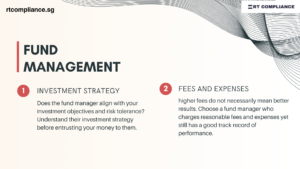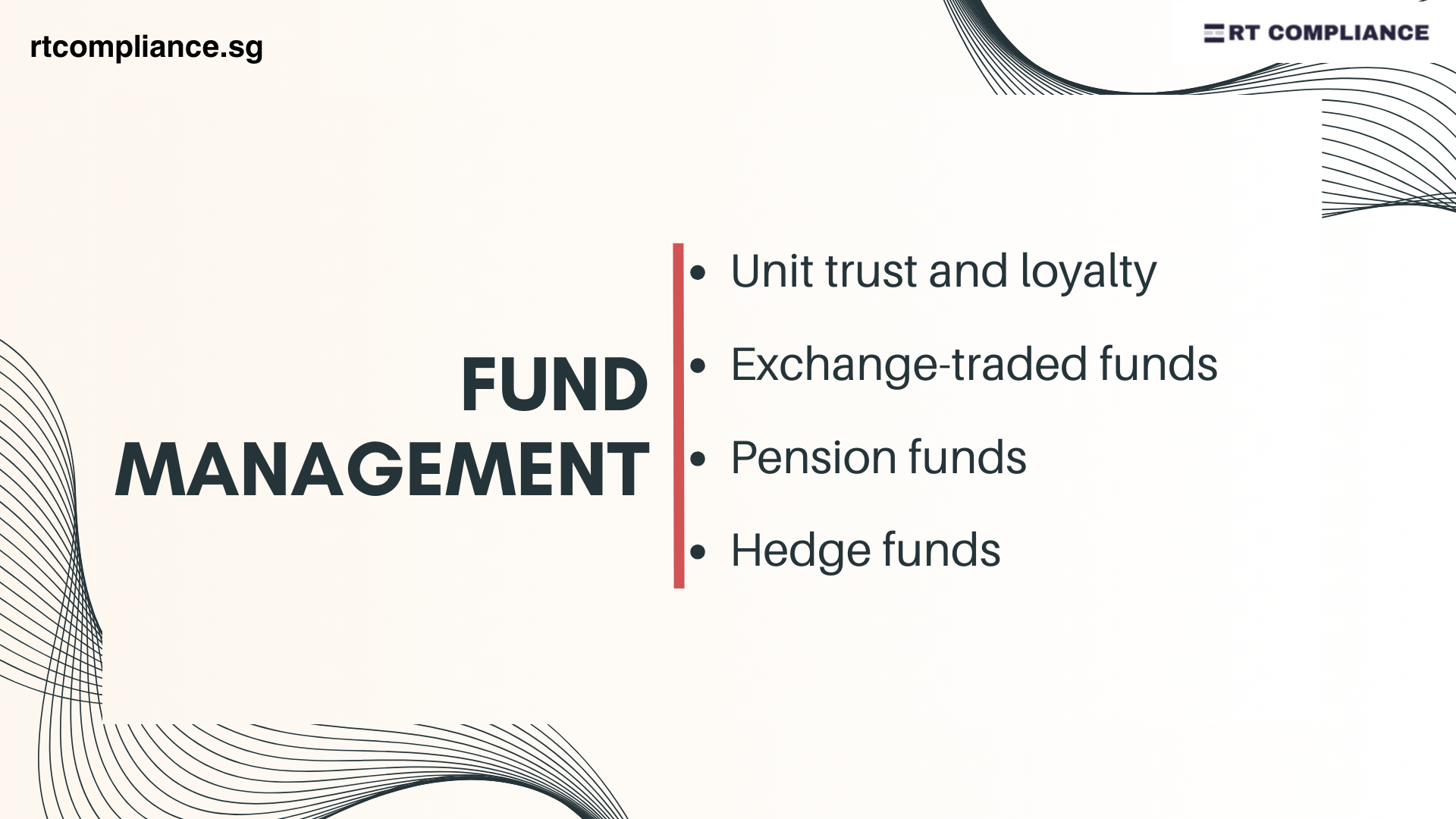Investing your money can be daunting and could be challenging, especially if you don’t have much experience. But with the help of a fund manager, you can entrust your money to someone who will grow it for you. In this article, we’ll introduce you to the concept of fund management in Singapore. We’ll also explain how it works and what benefits it can offer you in the broader asset management Singapore and investment management Singapore space.
A Step-by-Step Guide to Launching a Fund in Singapore
Launching a fund in Singapore involves multiple steps to ensure compliance with local regulations and create a successful investment vehicle. Here’s a step-by-step guide:
✔️ Choose the Fund Type
Decide on the type of fund you wish to establish, such as a Variable Capital Company (VCC), Limited Partnership (LP), or Exempt Private Fund. Each structure has specific regulatory and operational implications.
✔️ Appoint a Fund Manager
A licensed fund manager in Singapore is required to manage the fund. This could be a local or offshore entity holding a Capital Markets Services (CMS) license granted by the Monetary Authority of Singapore (MAS).
✔️ Obtain Necessary Licenses
If the fund manager does not already have a license, they must apply for the appropriate MAS license based on the type of fund management activities they intend to conduct, such as managing collective investment schemes or providing fund advisory services.
✔️ Prepare Fund Documentation
Develop key fund documents, including the Offering Memorandum, Private Placement Memorandum, Subscription Agreement, and Risk Management Framework. These documents should comply with MAS guidelines.
✔️ Set Up Operational Infrastructure
Establish necessary operational systems, including custodians, administrators, auditors, and compliance personnel. Consider technology platforms for efficient reporting and management.
✔️ Register with MAS
Register the fund with the Monetary Authority of Singapore (MAS). This includes submitting a detailed application that outlines the fund’s structure, investment strategy, and risk management approach.
✔️ Compliance and Reporting
Once launched, ensure ongoing compliance with MAS regulations, including reporting financials, adhering to anti-money laundering (AML) standards, and submitting annual audit reports.
✔️ Market the Fund
Once the fund is operational and legally registered, fund managers can begin marketing the fund to potential investors, following MAS guidelines on advertising and investor protection.
The Singapore Fund Management Industry (Singapore Asset Managers & Investment Firms)
The Singapore fund management industry is one of Asia’s most developed and mature. The country has a well-regulated environment, a developed infrastructure, and a large pool of talent. Singapore is home to many large fund managers, growing asset management firms in Singapore, and a number of boutique investment firms.
The Singapore government has been supportive of the development of the fund and asset management sector, implementing policies that attract more foreign and offshore fund management in Singapore. For instance, incentives are available for Singapore investment managers to set up regional headquarters — especially in hubs like the Singapore CBD.
With strong fundamentals, the Singapore fund management companies sector is positioned for further growth, including in niche areas like private wealth management, institutional fund management, and retail fund management.
Understanding Fund Management Regulations in Singapore
Fund management in Singapore is highly regulated to ensure the integrity, transparency, and efficiency of the financial markets. The primary regulatory body is the Monetary Authority of Singapore (MAS), which enforces a comprehensive set of rules to maintain financial stability and investor protection.
Key regulatory aspects include:
1. Licensing
Fund managers must be licensed by MAS under the Securities and Futures Act (SFA) or the Financial Advisers Act (FAA). The most common licenses include Capital Markets Services (CMS) for fund management, Registered Fund Management Company (RFMC), and Exempt Fund Manager for smaller funds.
2. Compliance with AML/CFT
Fund managers are required to implement anti-money laundering (AML) and countering the financing of terrorism (CFT) policies. This includes Know Your Customer (KYC) procedures, transaction monitoring, and suspicious activity reporting.
3. Reporting Requirements
Licensed fund managers must regularly submit financial statements, audit reports, and conduct compliance checks. These reports help MAS monitor adherence to regulations and manage systemic risks.
4. Investment Restrictions
Certain types of funds, such as retail funds, may be subject to investment restrictions, such as limits on leverage or asset classes. These restrictions are designed to protect retail investors and maintain market stability.
5. Tax Treatment
Singapore offers favorable tax policies for investment funds, including tax exemptions on certain fund structures and tax relief on foreign income, making it an attractive location for fund managers.
By understanding and adhering to these regulations, fund managers can ensure smooth operations and reduce regulatory risks.
The Different Types of Funds in Singapore
Since there are many different fund products available in Singapore, it can be challenging to know which one is right for you. This blog section will look at the different types of funds available and how they can help you reach your financial goals.
1. Unit trust and loyalty funs.
Unit trusts and loyalty are a type of collective investment scheme that allows investors to pool their money together to invest in a portfolio of assets. Many different unit trust schemes are available, each with its own investment objectives and risk profile.
2. Exchange-traded funds (ETFs).
ETFs are a type of fund that is traded on an exchange, like a stock. ETFs typically track an index or a basket of assets and offer investors exposure to a wide range of markets and sectors.
3. Pension and retirement funds.
Pension funds are retirement savings plans offered by employers or financial institutions. Employees make regular contributions to their pension fund, which is then invested in a range of assets to grow over time. When the employee retires, they will receive a lump sum payment from the pension fund that can be used to cover their living expenses in retirement.
4. Hedge funds and alternative investment vehicles
Hedge funds are private investment vehicles
The Pros and Cons of Fund Management in Singapore
Now that you have a better understanding of what fund management is and what it can do for you, it’s time to take a closer look at the pros and cons of this investment strategy.
PROS:
1) Singapore Fund managers can help you diversify your portfolio.
2) They can provide professional expertise and guidance.
3) Fund managers can help you save time and effort.
4) Potential tax benefits for funds in Singapore.
CONS:
1) You will be charged fees for their services.
2) There is no guarantee of success.
3) You may not have control over how your money is invested.
4) Possible compliance conflicts for fund managers in Singapore.
To Choose the Right Fund Manager in Singapore (Best Fund Management Companies in Singapore)
When it comes to investing your hard-earned money, you want to ensure that you entrust it to a competent and reliable fund manager. But with many options available in Singapore, how do you choose the right one?
Here are some factors to consider when selecting a fund manager in Singapore:
- Track Record
One of the ways to gauge a fund manager’s competence is to look at their track record. How well have they performed and worked in the past? Do they have a good history of achieving their investment objectives?
- Investment Strategy
Does the fund manager invest in a way that aligns with your investment objectives and risk tolerance? Ensure you understand the fund manager’s investment strategy before entrusting your money to them.
- Fees and Expenses
Of course, you also need to look at the fees and expenses charged by the fund manager. Remember, higher fees do not necessarily mean better results. Choose a fund manager who charges reasonable fees and expenses yet still has a good track record of performance.
Conclusion
Fund management in Singapore is a critical process, as it helps ensure that your money is well-managed and that you are getting the most out of your investments. There are several different fund managers in Singapore, so it is essential to do your research and find one that suits your needs. With the right fund manager, you can be sure that your money is in good hands and that you will be able to grow your portfolio over time.






